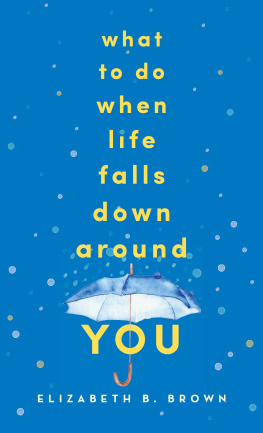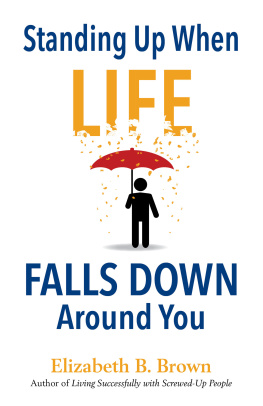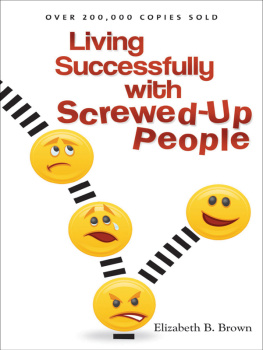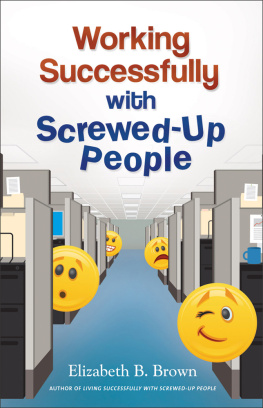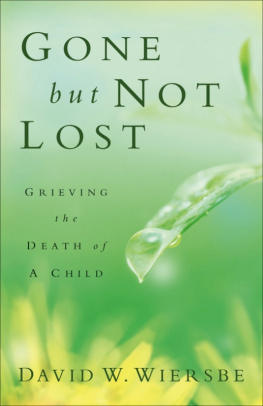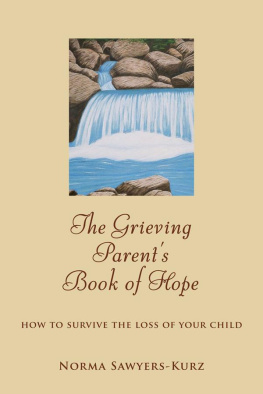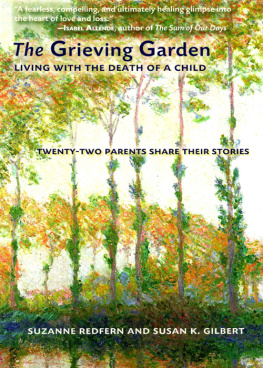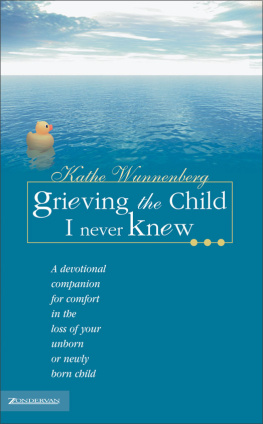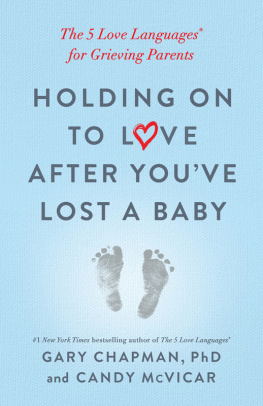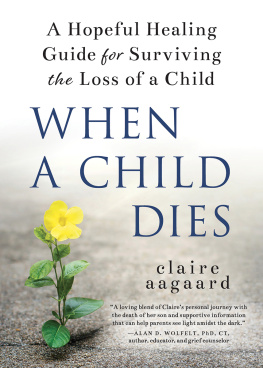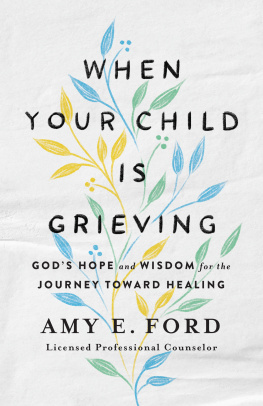Elizabeth B. Brown - Surviving the Loss of a Child: Support for Grieving Parents
Here you can read online Elizabeth B. Brown - Surviving the Loss of a Child: Support for Grieving Parents full text of the book (entire story) in english for free. Download pdf and epub, get meaning, cover and reviews about this ebook. year: 2010, publisher: Baker Publishing Group, genre: Religion. Description of the work, (preface) as well as reviews are available. Best literature library LitArk.com created for fans of good reading and offers a wide selection of genres:
Romance novel
Science fiction
Adventure
Detective
Science
History
Home and family
Prose
Art
Politics
Computer
Non-fiction
Religion
Business
Children
Humor
Choose a favorite category and find really read worthwhile books. Enjoy immersion in the world of imagination, feel the emotions of the characters or learn something new for yourself, make an fascinating discovery.

- Book:Surviving the Loss of a Child: Support for Grieving Parents
- Author:
- Publisher:Baker Publishing Group
- Genre:
- Year:2010
- Rating:5 / 5
- Favourites:Add to favourites
- Your mark:
- 100
- 1
- 2
- 3
- 4
- 5
Surviving the Loss of a Child: Support for Grieving Parents: summary, description and annotation
We offer to read an annotation, description, summary or preface (depends on what the author of the book "Surviving the Loss of a Child: Support for Grieving Parents" wrote himself). If you haven't found the necessary information about the book — write in the comments, we will try to find it.
Elizabeth B. Brown: author's other books
Who wrote Surviving the Loss of a Child: Support for Grieving Parents? Find out the surname, the name of the author of the book and a list of all author's works by series.
Surviving the Loss of a Child: Support for Grieving Parents — read online for free the complete book (whole text) full work
Below is the text of the book, divided by pages. System saving the place of the last page read, allows you to conveniently read the book "Surviving the Loss of a Child: Support for Grieving Parents" online for free, without having to search again every time where you left off. Put a bookmark, and you can go to the page where you finished reading at any time.
Font size:
Interval:
Bookmark:
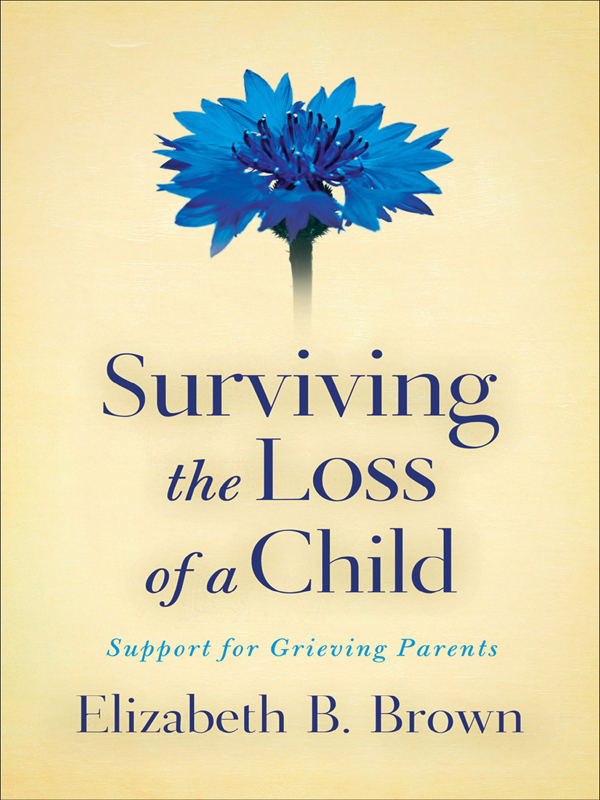
Surviving
theLoss
of aChild
Surviving
theLoss
of aChild
Support for Grieving Parents
Elizabeth B. Brown

1988, 2010 by Elizabeth B. Brown
Published by Revell
a division of Baker Publishing Group
P.O. Box 6287, Grand Rapids, MI 49516-6287
www.revellbooks.com
Original edition published in 1988 as Sunrise Tomorrow
Printed in the United States of America
All rights reserved. No part of this publication may be reproduced, stored in a retrieval system, or transmitted in any form or by any meansfor example, electronic, photocopy, recordingwithout the prior written permission of the publisher. The only exception is brief quotations in printed reviews.
Library of Congress Cataloging-in-Publication Data
Brown, Elizabeth B.
Surviving the loss of a child : support for grieving parents / Elizabeth B.
Brown.
p. cm.
Rev. ed. of: Sunrise tomorrow. 1988.
Includes bibliographical references.
ISBN 978-0-8007-3356-8 (pbk.)
1. BereavementPsychological aspects. 2. ChildrenDeathPsychological
aspects. 3. Parent and child. 4. Brown, Elizabeth B.Family. 5. Mothers
United StatesBiography. I. Brown, Elizabeth B. Sunrise tomorrow. II. Title.
BF575.G7B756 2010
155.9 37dc22 2009041670
10 11 12 13 14 15 16 7 6 5 4 3 2 1

To my husband, Paul,
who as we have walked together through
the high times and the low times
has become my true love,
and
Kim, Paul, LeeAnne, and Brad,
who have given meaning to the word
joy.
Contents
T his book is written to youa straight, no-holds-barred conversation about death. If you hurt from the loss of your child, this guide may help you put your life back together. If you are a friend of someone who has lost a child, you will find understanding and ways to support and uphold the griever.
If you have a child whose friend has died, you face one of lifes most difficult challenges, because the way you handle your childs grief will influence him throughout his years. You must understand the crucial needs of a child discussed here.
But I suppose that most who read this book are parents, parents like Paul and me, who have lost their dearest treasure. As the parents of the deceased child, your family unit is in danger of being swallowed by the tragedy. You must confront and jump the hurdles that come with your childs death. Failure means your family will face the dangers of divorce, severe depression, and inability to cope with life.
Surviving the Loss of a Child deals with the stunning harshness of our childs death. But more than that, it is a story of shock, grief, and finally of renewed hope. It is a story of survival.
1
Are We Alone?
L et go. You have to let LeeAnne go, Betty. The pain wont stop until you release her. The words echoed between my silent screams. Never! It is not possible to let go. Memories are all I have. If I turn her loose, she will be gone. My little girl will be gone....
My child is dead. My precious bubble of enthusiasm who made me feel needed and loved has been laid in a pretty, white casket. She is alone. They put her in a hole in the ground. That is no place for a little girl. She is going to be afraid. She needs her mommy.
The pain is so intense. Someone is dragging a knife through me, gouging me, turning it. No! It isnt a knife. It is a scream. A scream tears my body apart, pushing, penetrating. It fills my head until a low wail escapes. Convulsive heaves change to dry, wrenching vomiting. I feel tired, dull, lifeless. The silence is crashing like thunder. The scream is beginning again.
Sleep is gone. The endless nights are filled with fragmented thoughts, questions, wet pillowcases. Paul and I cling together, holding each other. His quiet sobs alternate with mine. The emptiness is a black hole that sucks our strength, consumes our emotions. It eats more voraciously in the stillness.
Is this just a dream? No. Dreams are not like this. Nightmares are not like this. They end. Tonight I relive choosing an outfit for Lees burialfor the thousandth time. The thoughts are like a McDonalds signWe sold 1 million hamburgers, 2 million.... I pick out the treasured purple, long dress with the pink sash, little crocheted socks with flowers. She wore that special dress to school, to church, to be a fairy princess. I add her soft Care Bear with the big heart. She would want something to cuddle. The sick feeling that filled my stomach when we left the dress at the funeral home begins again. Tonight makes 1,001. God, I cant stand this! Why didnt You save our little girl? I want her....
Children Do Die
We are alone, alone in the world. Children dont die. I mean real children, children who have been born and leave the hospital. I dont know anyone whose child died. No one looks at us. Everyone looks down or to the side. They know children dont die. They know! I know!...
But children do die. Every year in America, 228,000 children under the age of 24 die from catastrophic illness, accident, suicide, or murder, and those statistics do not include miscarriages, stillbirths, or the deaths of those over the age of 24. Fifteen out of every hundred infants dies before his or her first birthday: 28,600 deaths per year due primarily to prematurity or low birth weight. In addition there are 980,000 miscarriages and stillborn baby deaths per year.1 Accidents account for 12,175 child/youth deaths per year. Every day in the United States, eight youth ages nineteen and under are killed in homicides, suicides, and unintentional killings. For every child killed by a gun, four more are wounded.2
The good news, though the death rate of children steadily rose in the 1960s and 70s, is that it is now rapidly declining. Between 1980 and 2007, the death rates of children and youth dropped by 46 percent for infants, 51 percent for children ages one to four, 44 percent for children ages five to fourteen, and 32 percent for teens ages fifteen to nineteen. All types of death of children have decreasedexcepting suicide, which in 2007 began rising by as much as 9 percent.3 Dr. Stephen Soreff reports that 6.9 percent of high school students have attempted suicide.4 Suicide is the third leading cause of death between ages fifteen and nineteen, and the main cause between ages twenty and twenty-four.5
Unfortunately, 19 percent of the adult population has experienced the death of a child and 22 percent the death of a sister or brother. Evangelist Billy Graham said one out of four children and youth experience the death of a sibling, mother, or father before they graduate from high school. Taking into account people who have lost both a child and a sibling, 36 percent of the adult population has suffered the death of a child, a sibling, or both a child and a sibling. The Compassionate Friends, Inc., concludes from government reports that deaths from pre-birth through young adults is close to a million annually, leaving nearly two million bereaved parents every year.6
So, it is a myth that children do not die! Children do die! When your child dies, you are not alone. You are not the only person to have to survive such a tragedy. You, like others, will surviveif you choose to.
Next pageFont size:
Interval:
Bookmark:
Similar books «Surviving the Loss of a Child: Support for Grieving Parents»
Look at similar books to Surviving the Loss of a Child: Support for Grieving Parents. We have selected literature similar in name and meaning in the hope of providing readers with more options to find new, interesting, not yet read works.
Discussion, reviews of the book Surviving the Loss of a Child: Support for Grieving Parents and just readers' own opinions. Leave your comments, write what you think about the work, its meaning or the main characters. Specify what exactly you liked and what you didn't like, and why you think so.

